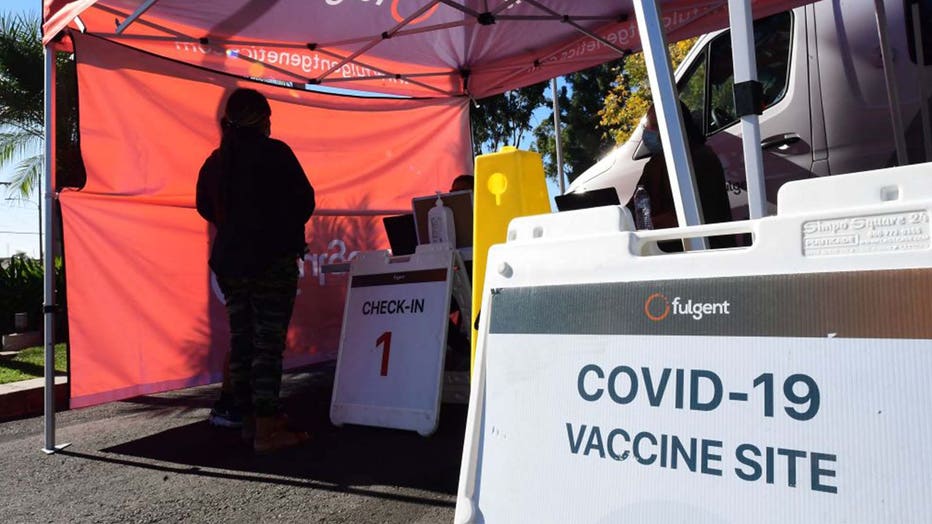Omicron variant: CDC expands COVID-19 booster recommendation to all adults 18 and older
Omicron variant: What to know about the new COVID-19 strain
An advisory panel of the World Health Organization classified on Nov. 27, 2021, a worrying new COVID-19 variant first detected in South Africa as a highly transmissible virus of concern, naming it "Omicron" under its Greek letter system.
The U.S. Centers for Disease Control and Prevention on Monday expanded its recommendation for COVID-19 booster shots to all adults 18 and older, according to a CDC news release.
"Today, CDC is strengthening its recommendation on booster doses for individuals who are 18 years and older. Everyone ages 18 and older should get a booster shot either when they are 6 months after their initial Pfizer or Moderna series or 2 months after their initial J&J vaccine," the CDC said.
Amid concerns over the "highly transmissible" omicron COVID-19 variant, the CDC continued to emphasize the importance of getting vaccinated as well as getting a booster dose to help stave off severe symptoms of the novel coronavirus and to prevent hospitalization.
"The recent emergence of the Omicron variant (B.1.1.529) further emphasizes the importance of vaccination, boosters, and prevention efforts needed to protect against COVID-19. Early data from South Africa suggest increased transmissibility of the Omicron variant, and scientists in the United States and around the world are urgently examining vaccine effectiveness related to this variant," the CDC continued.
RELATED: Canada is latest country to confirm cases of omicron variant
President Joe Biden called the new coronavirus variant a cause for concern but "not a cause for panic" Monday and said he was not considering any widespread U.S. lockdown. He urged Americans anew to get fully vaccinated, including booster shots, and return to wearing face masks indoors while in public settings to slow any spread.
Speaking Monday at the White House, Biden said it was inevitable that the new variant would reach the U.S., but he also said the country has the tools necessary to protect Americans — particularly the approved vaccines and booster shots.
When omicron arrives, and it will, Biden said, America will "face this new threat just as we’ve faced those that have come before it."
He appealed to the roughly 80 million unvaccinated Americans aged 5 and up to get their shots, and for the rest of the country to seek out booster shots six months after their second dose. He also encouraged everyone to get back to wearing face masks in all indoor public settings — a pandemic precaution that has fallen out of use across much of the country.
Meanwhile, the World Health Organization warned, also on Monday, that the global risk from the omicron variant is "very high" based on the early evidence, saying the mutated coronavirus could lead to surges with "severe consequences."

FILE - People check-in for their COVID-19 vaccine at a pop-up clinic offering vaccines and booster shots. (FREDERIC J. BROWN/AFP via Getty Images)
RELATED: Biden: Omicron variant ‘cause for concern’ but not panic, pushes COVID-19 shots
The assessment from the U.N. health agency, contained in a technical paper issued to member states, amounted to WHO's strongest, most explicit warning yet about the new version that was first identified days ago by researchers in South Africa.
It came as a widening circle of countries around the world reported cases of the variant and moved to slam their doors in an act-now-ask-questions-later approach while scientists race to figure out just how dangerous the mutant version might be.
Japan announced it is barring entry to all foreign visitors, joining Israel in doing so. Morocco banned all incoming flights.
Other countries, including the U.S. and members of the European Union, have moved to prohibit travelers arriving from southern Africa.
RELATED: WHO says omicron variant poses 'very high risk'
WHO said there are "considerable uncertainties" about the omicron variant. But it said preliminary evidence raises the possibility that the variant has mutations that could help it both evade an immune-system response and boost its ability to spread from one person to another.
"Depending on these characteristics, there could be future surges of COVID-19, which could have severe consequences, depending on a number of factors, including where surges may take place," it added. "The overall global risk ... is assessed as very high."
The Associated Press contributed to this report.

